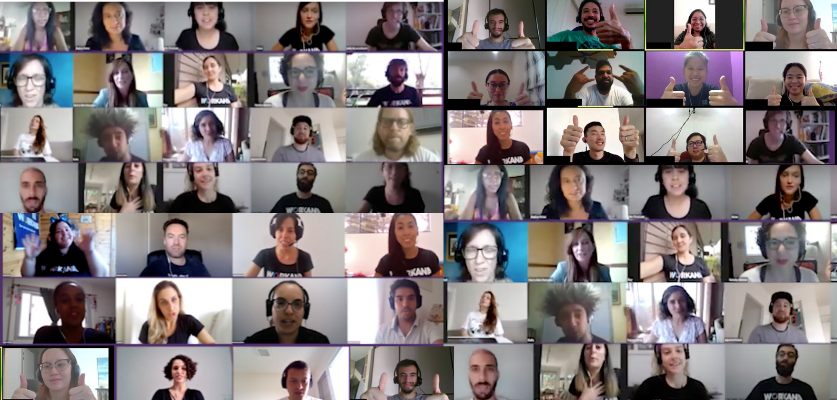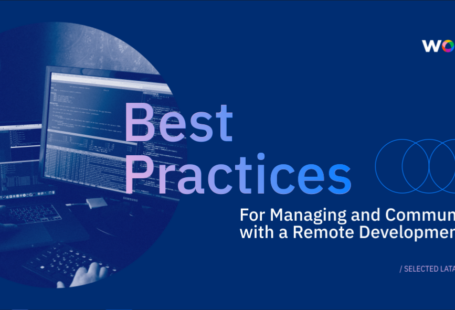This year, Labor Day is celebrated differently, without ceremonies, meetings, parties, or fanfare (at least not in-person!) Today marks a year of professionals and their work. At Workana, we’ve always celebrated Labor Day with a reflection to share our vision of how the work world is changing. There is, without a doubt, a lot to reflect on this year.
With each Industrial Revolution, the work world’s transformation intensifies and transforms. Between the First and Second Industrial Revolution, halfway through the 17th Century, much of the population moved from the countryside and agricultural activity to factories, turning factories into the main productive spaces of human capital.
Later on during the Third Industrial Revolution after World War II, larger companies and multinational corporations began to appear, and people have been undergoing profound technological changes ever since.
The current revolution is different. We’ve achieved a level of technological advances that allow for automating many processes where machines have begun replacing people on a few tasks where data processing and storage is possible at a minimal cost, artificial intelligence and big data are taking the lead, digitalization is a protagonist that reaches every aspect of society, variable distances has lost its value. This is the era that we live in: the 4.0 Revolution in the work world.
Human skills will not cease to exist; on the contrary, soft skills will become increasingly valued and require. Socio-emotional skills, creativity, self-management, and an entrepreneurial spirit are characteristics of a professional who is capable of understanding what the work world expects of them in the future.
How did work stop being “the place where we’re going?”

Allow us to explain: waking up in the morning every day, spending two hours commuting, signing in with a thumbprint for five minutes, working eight hours with a half hour lunch break…all of these routines have stopped making sense for many people even though this is still the real meaning of “going to work” for others.
The collective shared sentiment is that all companies must make sure that they have the best talent in their companies. But they themselves add an obstacle and limitation that the employee has to live a certain distance away from their office.
In hybrid companies that understand remote work as an open door to working with thousands of excellent professionals across the globe, whether they live around the corner or halfway around the world, they will produce results. That’s why it’s important for companies to understand that if they don’t adapt accordingly, they’ll be competing internationally for local talent.
Coronavirus’ Impact on Work
One of Coronavirus’ immediate collateral effects was a significant increase in the number of people working from home. How many of them can go back to the office without thinking of remote work as a possibility? How many of them will mange to go back to “normal” when the COVID-19 crisis is over?
Even though we don’t have an answer to that, many studies and surveys show that professionals who can work from home or wherever they want tend to produce more results, and this productivity is just one of the advantages that remote work provides.

The reality is that even before the global pandemic, remote work was already becoming a trend because of the flexibility and freedom that it provided, paving the way for a new idea of work with a greater work-life balance, including reinforcing the millennial generation’s lifestyle and purpose.
Coronavirus was a major catalyst for this movement because it obligated companies to implement something that maybe a few companies had been testing out for a while but hadn’t been finalized yet for a different reasons, maybe for not being a priority or not having management’s approval because they thought it wasn’t possible, without understanding that not only is it possible to lead remote groups through processes, culture, tools, and correct communication, it’s more beneficial.
We could already see how startups and a few advanced companies were already implementing Home Office policies once a week as a benefit, and of course, this got a lot of peoples’ attention. But the pandemic is compelling companies to invest in sectors where teleworking is possible with more people learning how to use remote technology.
As a result, there’s a visible permanent change toward remote work because people are changing their habits. Many have experienced things that they never had the opportunity to do before, and because of that, they can enjoy these things more.
Where professional workers will want to work in the post-COVID-19 era

Deciding which company to work for isn’t just the result of technological advances or millennials’ whims, it’s a field that has come to answer deeper questions about ourselves. As Workana Co-Founder Guillermo Bracciaforte emphasized in his TEDxCórdoba Talk:
Have you ever stopped to think about what work means to you? Work should have a high degree of freedom because if we don’t have freedom and autonomy, how can we be expected to give the best of ourselves?
Although it’s impossible to numerically predict how many companies and people will work remotely in the future, we understand that work relationships have been very affected by the pandemic, resulting in the advent of teleworking in global spheres uniting great talent and corporations.
No matter where you are or how you work, we want you to be able to work on your terms so you can succeed.

*This article was written by Daniel Schwebel, Country Manager of Workana Brazil
—
You might also be interested in:
- Remote work in risk contexts: How to face COVID19 in the workforce without compromising efficiency
- 23 free tools to help you work remotely during the Coronavirus quarantine
- The Best Virtual Collaborative Project Managers
- Self-Motivation: How to fall in love with your work?
- Freelancer Guide: 30 great ideas to work from home as a professional
- 7 ways to convince your team to bring on freelance talent
- [Downloadable material] Remote Work Guide





